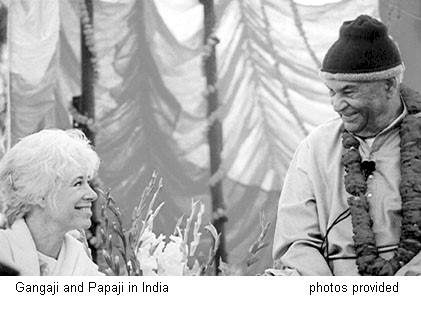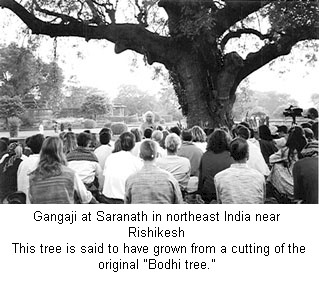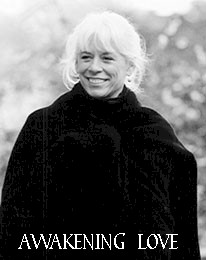For
a brief period of time in the early 1970s, I was a single mother on welfare.
I was involved in political protesting and I went through a painful divorce.
Eventually, I came out of those difficult times and pulled my life together
with the help of friends.
By the early 80s, I had become a successful acupuncturist
operating a clinic in San Francisco and I was with my soul mate. My daughter
had weathered the divorce and the hard times and she turned out okay. So
I was in a place of relative peace and success compared to the whole rest
of my life, yet this success didn't address a deeper discontent, a deeper
yearning. Having a house, making mortgage payments, having a good relationship,
having a good career and feeling satisfied with my life still didn't address
this deeper yearning. It was a shock to see that. Like many people, I assumed
that if I could just get my life together then I would be happy. I was
relatively happy, but there was a deeper unhappiness, a suffering. This
had to be addressed if I was to be honest with myself, and I was interested
in being honest.
My husband and I felt a call to
go into deep retreat. I closed down my practice as an acupuncturist. We
sold our house and moved to Maui. While my husband continued teaching and
leading groups, I withdrew from everything. I recognized that as successful
as my practice was, and as good as it felt to be considered "a healer,"
there was still some lie in this that was making me sick. I was aware of
the lie, but hadn't done anything to uncover it. For me the answer was
to withdraw from all my successes and go out on a limb.
Eventually it became clear that I needed something--perhaps
a teaching--to address this suffering I was experiencing. I wasn't looking
for an eastern teacher or guru, in particular. I just needed someone or
something to help me see what I couldn't see.
Within two years after that period of
retreat, I met my teacher, Sri Poonjaji (also known as Papaji) who happened
to be a man, who happened to be a guru, and happened to be an Indian--all
the things I wouldn't have expected. What he actually was and is to me
had nothing to do with being a guru or an Indian or a man. It had to do
with that which is the same in him and is the same in me and in you and
in everyone who reads this--this core of being.
Papaji was in that place of true being. Since
he was able to recognize that in me, this evoked the realization of that
which is always present, but goes overlooked. He had the force and depth
of character to point to it to the degree that I could recognize, "Oh that!
Of course, that is who I am!" Even though I had identified myself as woman
or welfare mother or successful practitioner, as spiritual or as non-spiritual,
as hedonistic or whatever--that presence of being had always been there.
All the definitions of myself were overlaid on top of that. In this phase,
my self-definition was as someone who is lacking something, even though
she has a lot. His direct pointing led me to investigate, "Who is lacking?"
Asking that basic question changed the whole
course of my life. For the first time, I questioned the questioner. Who
is separate? Who is unhappy? Who is incomplete? Who needs something? This
wasn't a mental questioning. I hadn't read the teachings of Vedanta. I
didn't know the correct answer. It simply threw my mind back into the reality
of the question. With the mind retreating back into the basic assumption
of the suffering, I felt the layers of my identification falling off--woman
falling off, person falling off, my name Toni falling off, acupuncturist,
seeker, unhappy childhood, human being, all falling off. The question was
going deeper than the layers of identification. We were going to a primal
beingness. When the question, "Who is incomplete?" hit its mark, there
was completeness and total fulfillment. There was no one that was incomplete.
All the incompleteness had simply been built into the misidentification
of myself as someone who was suffering.


In my meeting with Papaji, primal beingness was and is my ongoing experience.
It does not begin or end in time. My teacher has died, but the presence
of his teaching has no end. This is what I have to point people to. It's
not that I have anything to teach. I don't. Everybody has learned plenty.
There are certainly wonderful teachings about codes of conduct, and right
livelihood, and how to be a success, and how to not identify with success.
What I offer is not a teaching. It is simply a confirmation of the truth
of who one is--who everyone is. To the degree that there is an openness
to receive it, it is received all the way. At the very least, if it is
heard, it shakes something loose or at least begins the shaking.
My task is simple. It is a bridging--a returning
to what is basically the same in all of us. I know we have heard that intellectually,
but in the actual experience of it, one cannot continue the same level
of warring against another because of perceived differences. I had great
political differences from my teacher. Papaji was a very conservative Indian
patriarch who had been in the Indian Army. So what? We are all free to
disagree and we will disagree. That is the nature of opinions. But to disagree
knowing that at the root and center of our being we are one and the same,
this is very different from disagreeing with the evil "other"!

The first time I was with Papaji lasted only six weeks. About the fifth
week he told me to go back and share what I had realized. I said, "Oh my
goodness, I have no idea how to do that." He said, "Good, I don't want
you to know how. Just speak from what
you have experienced. Don't speak theoretically. Don't speak what you
think is correct. Just speak from your direct experience, and that will
touch people in the way they need to be touched."
At that point I hadn't had any major realization. I had
no idea what he meant, but I trusted him. I trusted that he knew more about
these things than I did. He was eighty years old and he had some mileage.
So I said ,"Okay, but how?" He said ,"Just wait and see. If somebody asks
you questions, answer them. If they don't ask, then you can invite a few
of your friends over for tea, and just see." Then it happened that a woman
was sitting next to me at Esalen, and she said, "I am experiencing some
burning just sitting next to you. What could that be?" I said, "Well, I
don't know, but it could be that this is what my teacher meant, so why
don't you come up to my room and we can just talk." That started it. Then
it grew from a living room gathering with a few people to hundreds of people
who come from places all around the world. I still don't know what I'm
going to say. Things come to me, but it's not that I plan or know. There
is this sameness that I absolutely know. I am always only talking to myself.
So there is a natural trust. You can trust yourself. Maybe you can't trust
your thoughts or emotions or circumstances, what you have learned or what
you believe, but you can trust yourself. Self is before all of that.

I have a very regular life. I live a relatively quiet life with my
husband in West Marin. I enjoy movies and videos. I have arguments with
my husband. I have good days and bad days, good health and bad health.
All of that is just the same. What is different is that rather than the
ground of suffering that was present before, there is a ground of peace.
The grounds got switched. Before, there were moments of peace that would
appear and disappear in the ground of suffering. Now, there are moments
of happiness or unhappiness that appear and disappear, but they appear
in the ground of peace.
This ground of peace was always here, but I was more identified with
the foreground than the background. When my teacher pointed me deeper into
consciousness, rather than staying on the surface of what was appearing,
I discovered the ground of peace which is immanently joyful.

To recognize that all you have is trust is the great freedom. This
surrender to trusting, and to being carried by the force that is present
in all of us, may even lead to discomfort or deprivation to some degree,
but in the long run this trust is following the dictates of a profound
desire.
At the time I first went to India, I was a health
practitioner. Because I had heard many tales of disease there, I packed
a suitcase full of tissue and toilet paper,  anti-bacterial
wipes, medicines, and special foods. After a long plane ride and a totally
chaotic entry into Delhi in the middle of the night, we got into a motorcycle
cart. We happened to arrive during Ramadan, a time of Muslim celebration,
and our driver was drunk. On a lark, he took us right into the Muslim district.
He was wild and swerving and wouldn't stop when we said, "Stop!" Suddenly,
I just let go saying, "What's the point. I have to trust this!" In that
moment there was such delight in the experience I was having. In one moment
I was in misery, exhausted, jet-lagged, furious and scared. The switch
was so complete in the surrender. We still said, "Stop," but we said it
in joy and in peace. This was a great teaching for me. I recognized that
if I was going to be in India, I had to let go. Otherwise it was gonna
be hell!
anti-bacterial
wipes, medicines, and special foods. After a long plane ride and a totally
chaotic entry into Delhi in the middle of the night, we got into a motorcycle
cart. We happened to arrive during Ramadan, a time of Muslim celebration,
and our driver was drunk. On a lark, he took us right into the Muslim district.
He was wild and swerving and wouldn't stop when we said, "Stop!" Suddenly,
I just let go saying, "What's the point. I have to trust this!" In that
moment there was such delight in the experience I was having. In one moment
I was in misery, exhausted, jet-lagged, furious and scared. The switch
was so complete in the surrender. We still said, "Stop," but we said it
in joy and in peace. This was a great teaching for me. I recognized that
if I was going to be in India, I had to let go. Otherwise it was gonna
be hell!
Similarly, with psychedelics, I once took
acid and it felt polluted and horrible. My experience was terrible. Then
there was a moment of "Okay, let it be what it is! Just surrender and let
go." Instantly it was blissful and peaceful.
The direct teaching in both these instances
was about the demonic power that the mind has in its attempt to control
and make everything be in place. This creates huge suffering. The mind
also has the sublime power to be willing to surrender and to see what is
here. Then, what is needed and called for becomes apparent. I'm not saying
that I shouldn't have packed the toilet paper and the antibacterial wipes.
I used them all and was happy I had them.

I am not well versed on the subject, but to speak to the question of
Y2K I will say this--if there is going to be a disaster, whether it be an
earthquake or Y2K-induced, meeting it fully is best done in surrender.
I think it is fine for people to prepare to whatever degree they want to,
but if they don't want to go crazy, there has to be a willingness to let
go.
The mind can't control life. It cannot control
the whole world or even one body. Surely this is obvious by this point.
If one simply allows the mind to surrender, then there is a natural, instinctive
meeting with one's circumstances and environment--a meeting and flow of
wisdom and clarity. Even in that, there may be great discomfort and suffering,
and maybe even death. But then it's a beautiful death, a beautiful suffering.
This is a suffering that is full, rather than contracted, or hiding, or
scurrying, or trying to fix things.
I have read some of the Y2K literature, and
I sense the paranoia in it. Living on a fault line, I understand the necessity
of having water and being prepared for earthquakes, to some degree. But
if your whole attention is on preparation, you can never get prepared.
You can prepare for several weeks, one year or ten years. What does that
mean? Building a bomb shelter? What about your neighbors? There must be
a degree of surrender to trust that what's needed will be made clear. People
will play different roles in that, but trust is the key.
The difficulty with trust is when you are
still playing with trusting but not trusting in the mind. Sooner
or later there will be some catastrophe that brings you to a point where
all you have is trust. Devotion is trust. If the challenges of life are
met in the trust of something unseen and unknown, then this is devotion
and it is beautiful. It is surrender too. It is all the same.

California's role has always been to throw off the status quo. I grew
up in Mississippi where people knew what their roles were. The promise
of not knowing the future was part of what drew me here. In California,
an earthquake could happen at any moment. That sense of uncertainty can
potentially drive people crazy and send them into despair. On the other
side, something bigger and greater can flourish. The bigger call is the
freedom here.
Growing up in the South, there was no way that a
woman could take a visible position of power. They had a lot of power from
behind the scenes, hidden or manipulated power, but when I came to California,
I could see and feel a difference. In the early 70s, when I came here,
there was such a bursting forth of discovering, "Well, who am I as a woman?"
This freedom was also stressful. I didn't handle my divorce
sensitively or kindly. I caused my husband and daughter a lot of suffering.
I was so into being free, and taking on a particular lifestyle as the young
twenty-eight-year old woman, that there was suffering and turmoil. Later,
in meeting Papaji, I could investigate, "Well, who am I, that is not even
a woman?"

The turmoil that arises out of planetary and societal shifts is a
natural part of life. The experience of any kind of change can cause
quite a bit of turmoil for those who resist it. Within the course
of such changes, one cannot deny that there will be suffering, and
there will be people who are lost. Yet, there is a promise--the promise
that peace can be discovered within oneself.
Certainly, I don't want people to suffer.
I don't want any person to suffer. But I trust something bigger in
potential. I can't say something bigger is "at work," but in potential
something bigger can break through. I am not a prophet or a future
seer, so I don't know how any of that will come about, but I trust
that the intelligence operating at the base of it all is learning
all the time. Intelligence actually learns.
First and foremost I say, "Discover who you
are!" From that knowing, do whatever you like, whether that
is political action, social action, health action, working with people,
or being a hermit. First discover who you are. That is primary, and
that has gone overlooked in our culture and in all cultures for far
too long.

Today women are much more visible in spiritual roles that historically
were held by men. I recently saw an interview in a spiritual magazine
where there was a discussion between some pretty famous people about
why it is that women have a harder time becoming enlightened.
The asking of that question is so ignorant, because what men have
called "enlightenment" has been a particularly male thing. It has
to do with certain codes, and definitions that separate the enlightened
from the unenlightened. Women, in their traditional role, include
everyone. Children have good and bad behaviors, but they are still
children, and they still deserve love. The issue of enlightenment
is a non-issue. Love is the issue. The attainment of a certain state,
or of a certain power, overlooks the stateless love that is present
in all states of power or powerlessness. Love is what women have the
opportunity to speak about forthrightly, and as hugely as we can speak
it. That is our role as women in this theater called awakening or
enlightenment.
It is very good news to me that you
have an article in this issue about a woman who goes into women's
prisons. To women suffering in prisons, or to those in countries such
as Afghanistan, where it is dangerous to be a woman, and to all women
around the world who might read this, I would say, "We are with you.
Let's discover that more and more."
